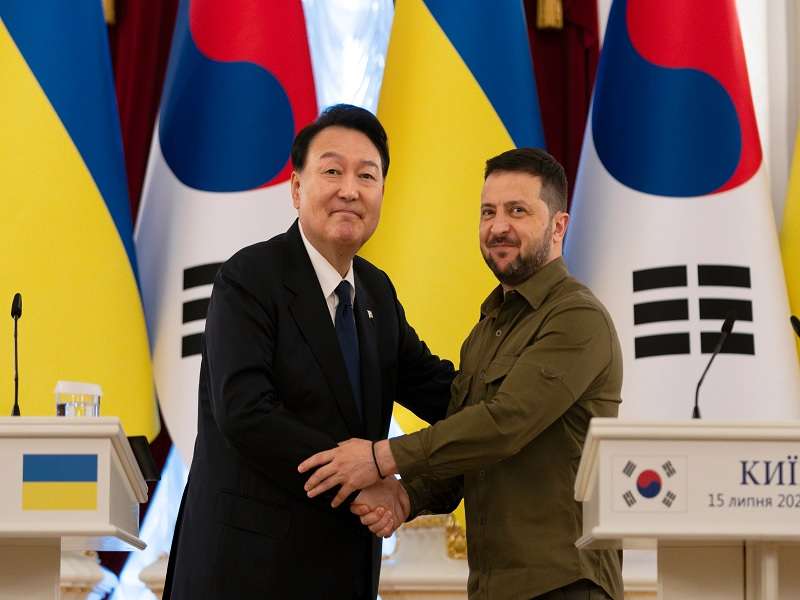The claims that North Korea sent troops to fight Ukraine, which have been circulating for the past two weeks and were recently analyzed here, have elicited a hypocritical response from South Korea. Its Deputy Foreign Minister first summoned the Russian Ambassador to demand the immediate withdrawal of its northern neighbor’s troops. This was then followed by a senior presidential aide telling the media that Seoul might soon send defensive and possibly even offensive arms to Ukraine if they don’t leave.
The first half implies that South Korea prefers for there to be more troops to fight against in the event that war resumes than for them to be abroad fighting Ukraine, while the second implies that it’s willing to deplete its stockpiles that were gathered for use against the North in order to help Kiev. Seoul has thus far resisted pressure upon it to send shells for supplying NATO’s proxy against Russia, at least officially, but the latest claims (irrespective of their veracity) might serve to move the needle on this.
South Korea has one of the world’s largest shell stockpiles, which could perpetuate the Ukrainian Conflict by replenishing Kiev’s forces at this critical moment when Western supplies are becoming exhausted, but it’s hitherto preferred to hold onto them in case war resumes with the North. Any change in this calculation would be significant since it would suggest that South Korea no longer assesses that there’s a high risk of that possibly happening anytime soon like has been the case for decades already.
It would also imply that South Korea finally feels comfortable enough depleting some of its gargantuan stockpiles for Ukraine’s sake even though one might have thought that it would hold on to them amidst rumors that North Korea has already sent shells, missiles, and now troops to Russia. After all, everything that North Korea reportedly gives to Russia is something less that it keeps in reserve for possible use against South Korea, yet Seoul’s hypocritical response contradicts that logic.
Seeing as how its interests aren’t served by having more North Korean troops and equipment along the DMZ, this can only mean that ulterior motives are responsible, namely US pressure upon South Korea to help perpetuate the Ukrainian Conflict as it approaches what might soon become a turning point. Russia is winning the “race of logistics”/“war of attrition” by far, so much so that even CNN recently drew attention to this. There’s thus an increasingly urgent need for Ukraine to obtain South Korean shells.
The failure to do so at the scale required, which can’t be taken for granted would occur even if a positive decision is soon made or already secretly has been made, would greatly raise the chances that the West coerces Ukraine into compromising with Russia. Even in that scenario, however, it also can’t be taken for granted that Russia will agree to whatever deal is offered. It might keep fighting until it achieves more of its goals, especially if it feels emboldened by the possibility of the front lines soon collapsing.
In any case, all of the above could potentially be averted as long as Ukraine has the shells required to hold the front line or at least prevent it from collapsing. Russia’s capture of Pokrovsk could accelerate the military-strategic dynamics that are already trending in its support, which is what Ukraine must absolutely avoid happening if it wants to perpetuate the conflict. Therein lies the reason why it so desperately needs more shells and other equipment from South Korea at this particular time.
While some might suspect that South Korea wants to perpetuate the Ukrainian Conflict by depleting some of its gargantuan stockpiles in order to redirect more North Korean troops away from the DMZ for as long as possible, this hypothesis presupposes a recruitment crisis in Russia, which is questionable. Talk about this has circulated for over the past two and a half years, yet nothing ever came out of it since Russia continues to gradually gain ground in Donbass, so there’s no precedent for lending credence to it.
South Korea therefore probably wouldn’t have any “5D chess master plan” in mind for approving the dispatch of shells and other military aid to Ukraine on the pretext of helping Kiev counter Russia’s reported recruitment of North Korean but would just be capitulating to long-standing US pressure. While small amounts might possibly be sent before the election, nothing significant is expected until afterwards, and such might not even follow if Trump wins and then tries to end this proxy war pronto.
Regardless of whatever happens, observers should remember the hypocrisy of South Korea’s response to these latest rumors since it serves as further evidence of growing US influence over its military-strategic calculations. Nobody ever doubted that this influenced existed since there are an estimated 24,000 US troops in the country, but South Korea had thus far prioritized its national security interests as its leadership sincerely understood them to be, though that finally seems to be changing.
